The Summer Course organized by the Faculty of Agricultural Technology UGM has entered its 5th day on Friday, August 12, 2022. The series of events on the third day started at 08.00 (GMT+7) and finished at 17.00 (GMT+7). In the fifth day, we discussed about Management and Supply Chain. There four sessions that deliverd by Mr. Henri Suhardja, Dr. Atris Suyantohadi, S.T.P., M.T, Assoc. Prof. Sastia Prama Putri, Ph.D, and Prof. Christine Hung.
The first session was delivered by Mr. Henri Suhardja with Challenges and Practices in Agricultural Product Supply Chain as the topic. As a founder of Retail Start Up Titipku, he explained how his platform solved agricultural supply chain problems. He told us that Titipku help merchant sell online, like Instacart, by bringing customers traffic and providing personal shopper for delivery services. Beside that, Titipku helps merchant organize better order and payment, also help merchant get access to cheaper inventory and capital.
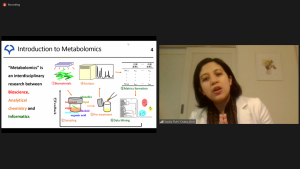 The second session we discussed about Smart Agricultural Enterprise Development from Soybean Farming, Post Harvesting and Agroindustry of Tempeh. This session was delivered by Dr. Atris Suyantohadi, S.T.P., M.T. He explained to us that Indonesia is the origin producer of tempeh, but ironically soybean productivity in Indonesia only on the average number. To increase national soybean productivity system, there are development ideas such as implementing modern technology on soybean production and develop the collaboration between farmers and multinational industry. As a Founder of Attempe Agroindustry, Dr. Atris also showed us tempeh production process. Tempeh is already known worldwidely because of its delicious tastes and nutritions. Tempeh may also the commodity key for Indonesia’s lacking economy solution. Nowadays, tempeh industries are still a small scale household industry. But in the future, as young generation, it is our hope and duty to make tempeh industries go globally.
The second session we discussed about Smart Agricultural Enterprise Development from Soybean Farming, Post Harvesting and Agroindustry of Tempeh. This session was delivered by Dr. Atris Suyantohadi, S.T.P., M.T. He explained to us that Indonesia is the origin producer of tempeh, but ironically soybean productivity in Indonesia only on the average number. To increase national soybean productivity system, there are development ideas such as implementing modern technology on soybean production and develop the collaboration between farmers and multinational industry. As a Founder of Attempe Agroindustry, Dr. Atris also showed us tempeh production process. Tempeh is already known worldwidely because of its delicious tastes and nutritions. Tempeh may also the commodity key for Indonesia’s lacking economy solution. Nowadays, tempeh industries are still a small scale household industry. But in the future, as young generation, it is our hope and duty to make tempeh industries go globally.
The third session was delivered by Prof. Sastia with Metabolomics Application to Solve the Problem of Food Loss in Supply Chain as the topic. She explained to us how metabolomics solved food loss with its interdisciplinary research between bioscience, analytical chemistry and informatics. The application of metabolomics for food production such as investigating the cause of disease in plant or aquaculture products, aid systematic and make postharvest management become effective also best to quality improvement. Metabolomics also can be applied to various food products such as natural food products or processed/fermented food products. The food metabolomics application can be used for component analysis, quality improvement, authenticity assessment and diet monitoring.
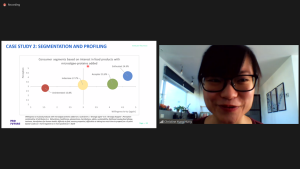 The last session was delivered by Prof. Christine Yung Hung, Ph.D. The topic was about Consumer Behavior and Marketing Analytics. She explained to us that studying consumer behavior is important because it can assess consumers’ needs and wants and also can understand the impact of health and sustainability. She told us that variation size of a beverage package is marketing strategy so one of the size can chosen more often when consumers compromise the options and it called the compromise effect. She also taught us about other marketing theory and analysis through many study cases, so we could understand the topic thoroughly.
The last session was delivered by Prof. Christine Yung Hung, Ph.D. The topic was about Consumer Behavior and Marketing Analytics. She explained to us that studying consumer behavior is important because it can assess consumers’ needs and wants and also can understand the impact of health and sustainability. She told us that variation size of a beverage package is marketing strategy so one of the size can chosen more often when consumers compromise the options and it called the compromise effect. She also taught us about other marketing theory and analysis through many study cases, so we could understand the topic thoroughly.

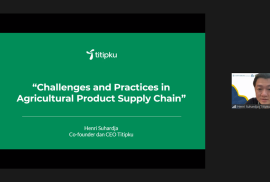
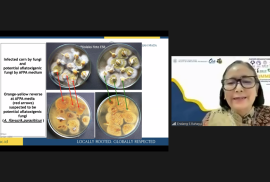
 The series of events on the fourth day started at 07.55, which started with an opening by the master of ceremonies. Then continued with the first session by Dr. Widyastuti Setyaningsih, S.T.P. with “Application of experimental designs to develop analytical methods for bioactive compounds in foods” as topic. This session was also accompanied by Ashri Nugrahini, S.T.P., M. Sc.. Dr Widyastuti starts the topic with how bioactive compounds in rice can be separated with chromatographic methods. And then this method can be replaced with other experimental designs. The experimental design can be applied using analytical extraction techniques, namely MAE and PLE and analytical separation techniques, namely HPLC-PDA and UPLC-PDA-FD.
The series of events on the fourth day started at 07.55, which started with an opening by the master of ceremonies. Then continued with the first session by Dr. Widyastuti Setyaningsih, S.T.P. with “Application of experimental designs to develop analytical methods for bioactive compounds in foods” as topic. This session was also accompanied by Ashri Nugrahini, S.T.P., M. Sc.. Dr Widyastuti starts the topic with how bioactive compounds in rice can be separated with chromatographic methods. And then this method can be replaced with other experimental designs. The experimental design can be applied using analytical extraction techniques, namely MAE and PLE and analytical separation techniques, namely HPLC-PDA and UPLC-PDA-FD.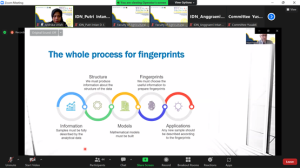 In the third session, Prof. Miguel Palma explained the material about Chemometric Tools in Food Analysis : from Numerical Data to Fingerprints. This session was moderated by Ardhika Ulfah, S.T.P., M.Sc.. Prof. Miguel Palma, in this session begins with an explanation regarding the analysis of the web browser’s working system so that it can meet the needs of its users through the collection of user behavior data. This can be applied to the food industry by collecting data so that fruit or vegetables can be sorted without touching or damaging them based on an existing data base. Another use in the food industry is that fingerprints enable simple, fast, and automated answers that can assist identification and quality control in food companies.
In the third session, Prof. Miguel Palma explained the material about Chemometric Tools in Food Analysis : from Numerical Data to Fingerprints. This session was moderated by Ardhika Ulfah, S.T.P., M.Sc.. Prof. Miguel Palma, in this session begins with an explanation regarding the analysis of the web browser’s working system so that it can meet the needs of its users through the collection of user behavior data. This can be applied to the food industry by collecting data so that fruit or vegetables can be sorted without touching or damaging them based on an existing data base. Another use in the food industry is that fingerprints enable simple, fast, and automated answers that can assist identification and quality control in food companies.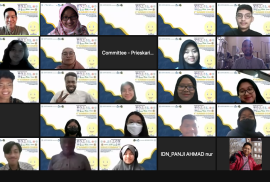
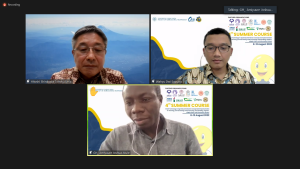 The first session was presented by Prof. Tsuyoshi Okayama, entitled Smart Agriculture Implementation in Japan. In this session, accompanied by Dr. Mirwan Ushada, S.T.P, M.App.Life Sc. as a moderator, Prof. Tsuyoshi explained the agricultural situation in Japan, agricultural machines with autopilot technology, and drone functions in Japan. Japan is experiencing a decrease in the number and aging of farmers, with an increase in the area of ??land per farmer each year. The development of smart agriculture consisting of automation of agricultural machines, agricultural management systems, and 5G internet can ease the workload of farmers and increase the quality and quantity of production. In addition, Prof. Okayama also presented about robots and agricultural services used by Japan. The robot shown is a robot that is used to cut grass and harvest asparagus using image recognition. The agricultural service presented was Raas, a service robot that aims to be rented and paid for according to the harvested production.
The first session was presented by Prof. Tsuyoshi Okayama, entitled Smart Agriculture Implementation in Japan. In this session, accompanied by Dr. Mirwan Ushada, S.T.P, M.App.Life Sc. as a moderator, Prof. Tsuyoshi explained the agricultural situation in Japan, agricultural machines with autopilot technology, and drone functions in Japan. Japan is experiencing a decrease in the number and aging of farmers, with an increase in the area of ??land per farmer each year. The development of smart agriculture consisting of automation of agricultural machines, agricultural management systems, and 5G internet can ease the workload of farmers and increase the quality and quantity of production. In addition, Prof. Okayama also presented about robots and agricultural services used by Japan. The robot shown is a robot that is used to cut grass and harvest asparagus using image recognition. The agricultural service presented was Raas, a service robot that aims to be rented and paid for according to the harvested production.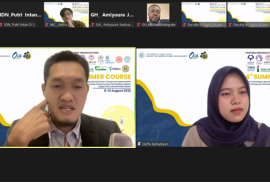
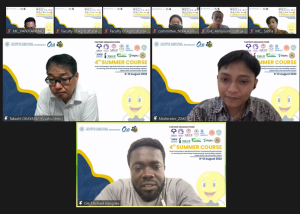 The fourth session which was also the last session was presented by Asst. Prof. Ravipim Chaveesuk. Mrs. Ravipim presentation entitled “The Implementation of Computational Intelligence (Neural Network and Fuzzy Logic) in the Agricultural System”. This session was accompanied by Mr. Imam Bagus N, S.Si. M.Sc. as a moderator. Mrs. Ravipim explained data analytics is the process of analyzing raw data to extract actionable information and insights. There are three components of data analysis such as business knowledge; mathematics, statistics, data visualization, machine learning, deep learning; and programming. In addition, data analytics has stages depending on the level of difficulty and value. They are Descriptive, Diagnostic, Predictive and Prescriptive Data Analytics. Descriptive data analysis is considered past data to answer what happened which generally considers one variable. Data diagnostics is to consider past data and analyze it. Predictive data analytics uses past data to predict what will happen tomorrow or in other words what to expect. And finally, prescriptive data analytics is making decisions. Some big data are known as 3V such as volume, speed, and variation. Data analysis is typically used by these top sectors such as marketing, sales, social media, credit and insurance, and manufacturing.
The fourth session which was also the last session was presented by Asst. Prof. Ravipim Chaveesuk. Mrs. Ravipim presentation entitled “The Implementation of Computational Intelligence (Neural Network and Fuzzy Logic) in the Agricultural System”. This session was accompanied by Mr. Imam Bagus N, S.Si. M.Sc. as a moderator. Mrs. Ravipim explained data analytics is the process of analyzing raw data to extract actionable information and insights. There are three components of data analysis such as business knowledge; mathematics, statistics, data visualization, machine learning, deep learning; and programming. In addition, data analytics has stages depending on the level of difficulty and value. They are Descriptive, Diagnostic, Predictive and Prescriptive Data Analytics. Descriptive data analysis is considered past data to answer what happened which generally considers one variable. Data diagnostics is to consider past data and analyze it. Predictive data analytics uses past data to predict what will happen tomorrow or in other words what to expect. And finally, prescriptive data analytics is making decisions. Some big data are known as 3V such as volume, speed, and variation. Data analysis is typically used by these top sectors such as marketing, sales, social media, credit and insurance, and manufacturing.